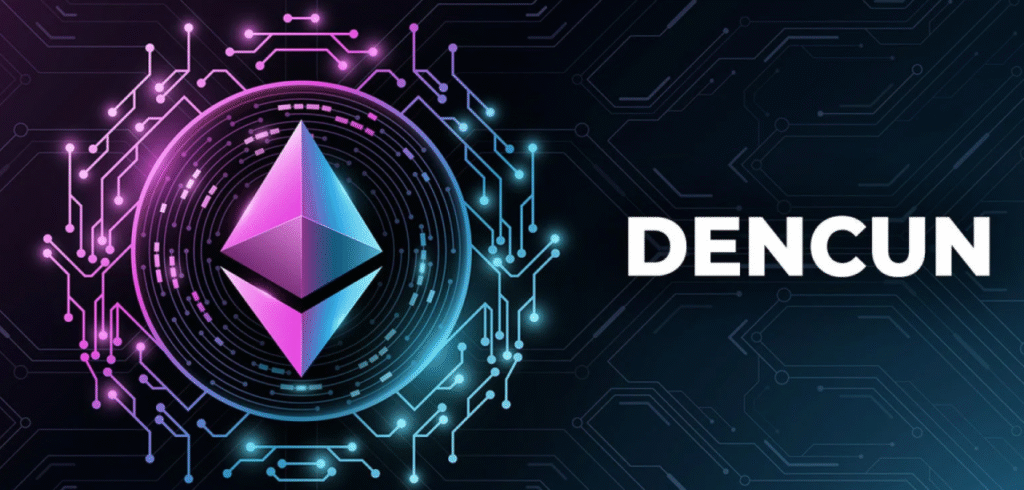Ethereum users worldwide are breathing a sigh of relief as gas fees on the network have dropped to their lowest levels in three months following the much-anticipated Dencun upgrade. This significant improvement in transaction efficiency marks a pivotal moment for the blockchain ecosystem, addressing longstanding concerns about high costs and scalability.
What is the Dencun Upgrade?
The Dencun upgrade, implemented earlier this month, is a combination of two major Ethereum improvement proposals (EIPs) designed to optimize the network’s performance and reduce transaction costs. Specifically, it targets gas fee reduction by streamlining transaction processing and improving data handling. The upgrade represents a crucial step toward Ethereum’s long-term vision of becoming a more scalable and user-friendly platform.
According to the Ethereum Foundation, Dencun merges the “Deneb” beacon chain consensus changes with the “Cancun” data shard protocol enhancements. These enhancements reduce the amount of data required per transaction, thus lowering the computational load and gas fees for users.
Gas Fees: Why They Matter
Gas fees are the payments users make to process transactions or execute smart contracts on the Ethereum network. High gas fees have been a significant barrier for many, especially smaller investors and developers, limiting Ethereum’s widespread adoption.
Before the upgrade, average gas fees had surged to levels making microtransactions economically unviable. In January 2025, fees hovered around 35 Gwei (gigawei, a denomination of Ether), making even simple transfers costly during network congestion.
The Impact of the Upgrade on Gas Fees
Following the Dencun upgrade, data from Etherscan indicates that average gas fees have dropped to approximately 15 Gwei, representing a nearly 57% reduction. This marks the lowest average gas fee since October 2024.
Experts suggest that this drop is due to improved data efficiency and enhanced transaction throughput. “The Dencun upgrade reduces the overhead required for transaction processing, which directly translates into lower gas costs,” says Dr. Lina Chen, a blockchain analyst at CryptoInsights.
This fee reduction has immediate benefits for decentralized finance (DeFi) applications and non-fungible token (NFT) marketplaces, where frequent small transactions are the norm. “Lower gas fees make it economically feasible for more users to participate in DeFi and NFT activities without worrying about exorbitant costs,” explains Chen.
User and Developer Reactions
The Ethereum community has responded positively to the upgrade. Marcus Lee, a DeFi developer based in Singapore, notes, “Since the Dencun upgrade, we’ve seen an uptick in user transactions on our platform, especially from retail investors who had been priced out previously.”
Similarly, retail users are feeling the difference. “I transferred some Ether for the first time in months without worrying about high fees eating into my balance,” says Anna Petrova, a cryptocurrency enthusiast from Moscow.
However, some caution remains as network conditions can fluctuate. “While the upgrade is a major step forward, gas fees can still spike during periods of extreme network demand,” warns blockchain consultant Javier Morales.
What’s Next for Ethereum?
The Dencun upgrade is part of Ethereum’s ongoing roadmap to enhance scalability and reduce costs, building on previous milestones like the Merge and the introduction of rollups. The Ethereum Foundation is also pushing for further shard chain implementation, expected later this year, which promises to dramatically increase transaction capacity.
Investors and users will be watching closely to see if these improvements can maintain low fees in the long term and help Ethereum fend off competition from alternative blockchains.
Conclusion
The Dencun upgrade has delivered a much-needed breath of fresh air for Ethereum users by cutting gas fees to a three-month low. This improvement not only makes the network more accessible but also reinforces Ethereum’s position as a leader in the blockchain space. While fluctuations remain possible, the path forward looks promising for users and developers alike.
Disclaimer: This article is for informational purposes only and does not constitute financial advice.


















